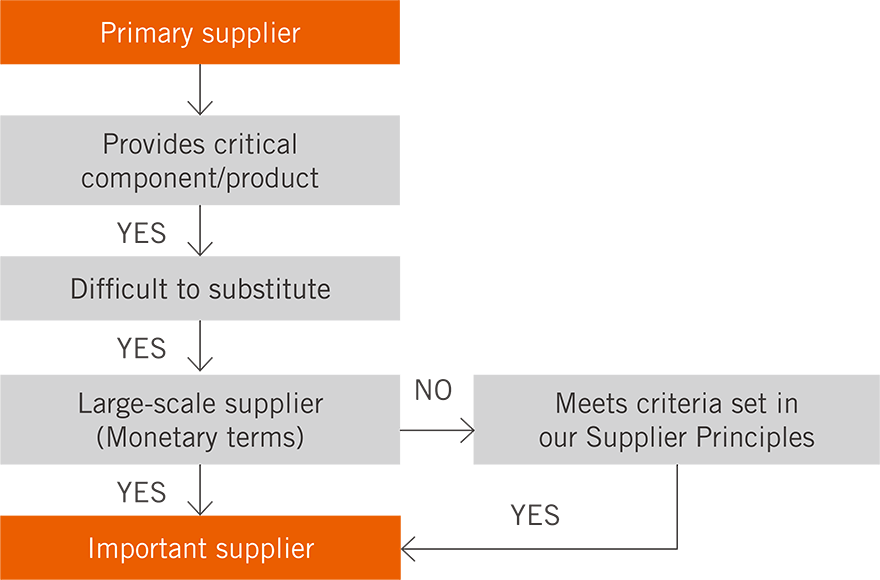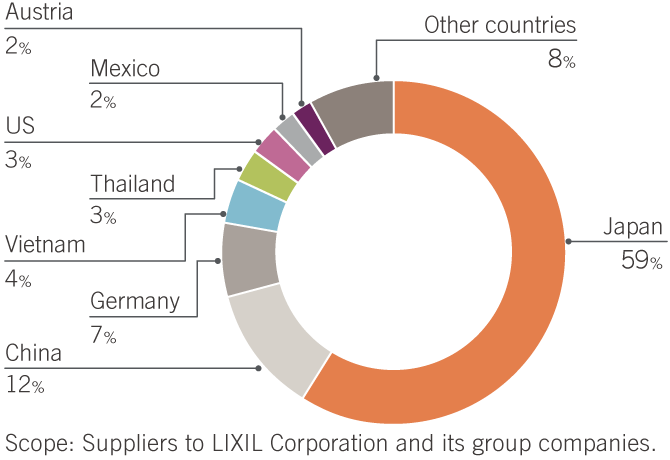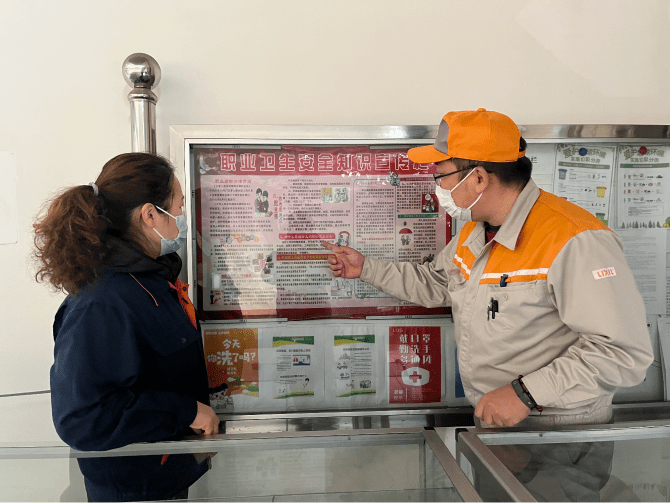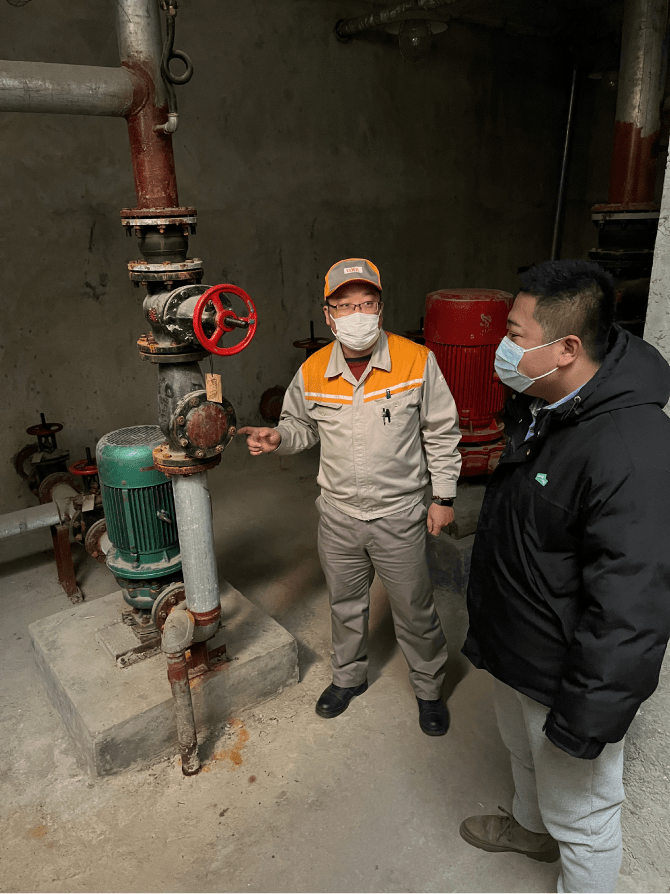LIXIL makes pioneering water and housing products that solve everyday, real-life challenges, making better homes a reality for everyone, everywhere.
- Global Site
-
- English
- Japanese
- Brand Sites
Global
- Global Site
-
- English
- Japanese
- Brand Sites

Progress in FYE2023
- Responsible procurement survey coverage ratio:
- 90%
- Responsible procurement survey conformity rate:
- 92%
- Improvement rate:
- 100%
Our Approach
At LIXIL, supply chain management is one of our material issues and forms the foundation of our Impact Strategy. We are committed to promoting the responsible procurement and ensuring a stable supply of products. Stemming from this belief, we base our procurement on the Ten Principles of the United Nations Global Compact (UNGC) in the four areas of human rights, labor, environment, and anti-corruption. In accordance with the UNGC principles as well as our Procurement Principles and our Global Policy on Third Party Compliance for Suppliers, we seek to build sound partnerships with global suppliers to carry out procurement activities. Our Code of Conduct also specifies the ethical behavior that is expected of all employees and officers, including prohibition of bribery. Based on the LIXIL Human Rights Principles, we strive to uphold the human rights of our business partners including suppliers. In addition, the principles state that we also expect our business partners including suppliers to support the content of the principles and to adopt similar principles.
Meanwhile, our Supplier Code of Conduct compiled in FYE2018 has been translated into multiple languages and distributed to suppliers, requiring them to respect human rights, observe international labor standards, conserve the global environment, and ensure fair business conduct. In FYE2023, we revised the Code to add stipulations related to factors such as human rights, labor and the environment, and strengthened our risk management system by specifying the reporting hotline for violations and other concerns. The Code now also states that we expect compliance not only from direct suppliers, but also their own suppliers.
Additionally, in January 2020, we created Green Procurement Guidelines outlining our policy and standards for procuring parts and materials that exert the least impact on the environment. In collaboration with our environmental management department, we ask suppliers to understand and support our environmental initiatives and procurement activities based on these guidelines.
Green Procurement Activities Pursued by LIXIL
① Establishment of Environmental Management System
② Abidance by Environmental Compliance
③ Thorough Management of Chemical Substances
④ Reduction of Greenhouse Gas Emissions
⑤ Conservation of Water Resources
⑥ Promotion of Resource Recycling
⑦ Conservation of Biodiversity
To meet the expectations of society and respond to changes in our supply chain, we continuously review our procurement practices and policies. When revising the Procurement Principles, we ensure alignment with the Supplier Code of Conduct and the Green Procurement Guidelines, which state that we expect suppliers to address sustainability issues.
In Japan, we endorsed the objectives of the Conference on Promoting Partnership Building for the Future promoted by the Cabinet Office and the Small and Medium Enterprise Agency (an agency of the Ministry of Economy, Trade and Industry) and announced the Declaration for Building Partnerships. We aim to build a sustainable relationship of co-existence and co-prosperity throughout the supply chain, and in FYE2023 we made all employees and business partners aware of what is stated in the declaration. Following guidelines established by the Fair Trade Commission and other government agencies, in January 2024 we also established our Policy on Arrangements for Appropriate Transaction Prices and shared it with all related employees and our business partners. We will continuously monitor implementation of the policy to ensure it is used appropriately.
LIXIL Procurement Principles (A new page will open) PDF: 46KB >
Human Rights >
Supplier Code of Conduct (A new page will open) PDF: 116KB >
Green Procurement Guidelines (A new page will open) PDF: 241KB >
Declaration for Building Partnerships (Japanese only, a new page will open) PDF: 145KB >
Policy on Arrangements for Appropriate Transaction Prices (Japanese only, a new page will open) PDF: 302KB >
Promoting Responsible Procurement That Upholds the Environment and Human Rights
Selecting New Suppliers
Our criteria to select suppliers include the following areas: quality, cost, delivery, technical capabilities, and ability to deliver stable supply; environmental consciousness, such as sustainable use of resources and proper control of chemical substances; human rights; and occupational safety. We require new suppliers to understand and accept our Supplier Code of Conduct. Once suppliers are selected, we also conduct assessments of their products.
LIXIL conducts risk assessments of new suppliers by checking written responses to surveys on compliance. Depending on the results of an initial risk screening, which are based on risks arising from the relationship with suppliers (e.g. products and services, characteristics, industry and geographic locations), we also ask about their measures for anti-corruption, labor management, occupational health and safety, and human rights.
Monitoring Existing Suppliers
We also conduct regular inspections of our existing suppliers.
LIXIL employs the process outlined below to designate important suppliers, which will be prioritized when sharing procurement policies, conducting surveys, and checking progress toward improvement.
Based on transaction value, 59% of LIXIL suppliers are located in Japan, followed by China, Germany, and Vietnam. For major suppliers in Japan, we hold annual meetings to explain our Procurement Principles, Supplier Code of Conduct, and supply chain management strategy. At this time, we also request suppliers’ cooperation with our responsible procurement survey.
Flowchart for Important Suppliers Identification

Procurement Transaction Amount Breakdown by Country

Conducting and Following Up on Responsible Procurement Survey
LIXIL identifies supply chain risks by conducting a responsible procurement survey and checking subsequent progress. Survey results form part of the basis for selecting suppliers or determining whether to continue business with an existing partner.
Details of the process are outlined below.
1) Select suppliers to be surveyed based on previous year’s transaction value, etc.
2) Conduct a responsible procurement survey for chosen suppliers, covering CSR management, fair business, human rights, labor, occupational health and safety, conservation of the global environment, and contribution to the community.
3) Compile survey results, classifying suppliers with substandard conformity rates as high-risk.
4) Manage high-risk suppliers individually to encourage improvement.
We conduct a 50-question online survey* that closely aligns with the Supplier Code of Conduct to facilitate prompt response. When we identify issues requiring remediation through the responsible procurement survey or a site visit, we work together with the supplier to discuss a remediation plan and then offer support in carrying it out.
- Examples of Remedial Actions
-
- ・For a supplier that had issues implementing a human rights training program for their employees, we obtained free training materials and movies from reliable public sources and shared them with the supplier. They then used these materials to provide a human rights training program for their employees.
- ・For a supplier that had issues formulating a written employee code of conduct, we considered key aspects covered by our Code of Conduct and prepared a template that we provided to the supplier. They used this to help review and revise their own code of conduct. This also helped us prevent discrepancies between the company’s code of conduct and our own Supplier Code of Conduct that we require all suppliers to comply with.
In Japan, we determined a five-year plan and specific targets for expanding the coverage of secondary suppliers in FYE2022. We started implementing the plan in FYE2023 and will gradually expand the scope of the survey.
In the Asia region, we conducted a full-scale survey of our primary suppliers in China in FYE2022. In FYE2023, we expanded the scope of the survey to include our primary suppliers in the Americas region. We are also taking similar steps to identify risks and implement remedial measures in the EMENA region.
*In FYE2025, the number of questions was increased in the fair business and human rights sections of the responsible procurement survey in Japan. Hence, the Japanese version of the survey and those in other languages differ in the number of questions. The revised survey will be released in other languages in FYE2026.
Number of Items in the Responsible Procurement Survey
| CSR management | 5 |
|---|---|
| Fair business | 14 |
| Human rights | 9 |
| Labor | 6 |
| Occupational health and safety | 7 |
| Conservation of the global environment | 7 |
| Contribution to the community | 2 |
| Total | 50 |
Responsible Procurement Survey Results
| Activities | KPI | FYE2021 | FYE2022 | FYE2023 | ||||
|---|---|---|---|---|---|---|---|---|
| Targets | Results | Targets | Results | Targets | Results | |||
| Distribute Procurement Principles, follow up on survey results and related activities | Coverage ratio (based on purchased amount) | Japan | 90% | 94% (1,293) |
90% | 90% (1,357) |
90% | 90% (1,185) |
| Overseas | 90% | 85% (378)*1 |
90% | 90% (415) |
90% | 90% (421) |
||
| Total conformity rate | Japan | 90% | 91% | 90% | 91% | 90% | 92% | |
| Overseas | - | 89% | - | 89% | -*2 | 92% | ||
| Improvement rate | Japan | 100% | 100% | 100% | 100% | 100% | 100% | |
Scope: Suppliers to LIXIL Corporation and its subsidiaries. Figures in parentheses represent the number of applicable companies.
Japan: Procurement by operating sites in Japan
Overseas: Procurement by operating sites outside Japan
*1 If we exclude the Asia region from the scope, which we have started to cover in the survey by stages in FYE2021, the result goes up to 92% (336 companies).
*2 Not fixed yet as the scope is now under reconsideration.
Strengthening Support to Suppliers Worldwide
Our employees in procurement departments select suppliers and conduct purchasing in compliance with the Procurement Principles and the Global Policy on Third Party Compliance for Suppliers. They play an important role in addressing sustainability issues in our supply chain. Conducting responsible procurement surveys and offering individual guidance, site visits for high-risk suppliers help promote sustainable partnerships and strengthen our supplier base, the primary goals of our supply chain management strategy.
At LIXIL, members of the headquarters procurement department provide trainings for members of regional and local procurement departments. Training programs cover both classroom learning and the on-the-job training such as joint visits to our suppliers. Fostering responsible procurement across the company enables us to provide the necessary support to our suppliers.
Employee Education at International Factories
We conducted training for procurement departments at our factories in China. Lectures led by members of the headquarters procurement department provided information on the importance of responsible procurement and related social trends, enhancing the understanding of the company’s challenges under our Procurement Principles. In addition to that, as part of the on-the-job training, personnel from local and the headquarters procurement departments jointly visited supplier factories to assist with aspects requiring improvement.
Local staff commented on how the experience reinforced their understanding of the importance of responsible procurement, and inspired them to utilize insights gained through the training to help their suppliers with improvement activities.
International Factories Provide Follow-Up to Suppliers
The procurement departments at factories outside Japan where the above training took place make their own plans and conduct their own independent follow-up activities such as supplier visits and support.
We receive regular reports from our factories in China that experienced onsite training about their follow-up activities with suppliers, and we are seeing more examples of where those activities have led to concrete improvements in safety, disaster risk reduction, and other measures. We plan to further strengthen these follow-up activities and introduce them in other regions as well.

Health and safety education for suppliers

Visiting a supplier and checking the management of a pressure pump used for firefighting
Follow-Up Activities with Japanese Suppliers
We follow up with suppliers in Japan through onsite visits and online interviews. The COVID-19 pandemic has prompted us to hold more virtual dialogues with suppliers, which made our follow-up process more systematic and efficient and allowed us to engage in dialogue with more suppliers.
We share with them information on issues and risks identified through our responsible procurement survey. We also support them with their own sustainability initiatives, such as by providing guidance on sustainability-related information disclosure and communication.
An employee from headquarters procurement department, which is in charge of follow-up activities inside and outside Japan, said, “Responsible procurement initiatives are the first step toward strengthening compliance. We strive to emphasize the significant long-term upsides of responsible procurement to suppliers and get to know the suppliers as closely as possible so that we can extend any necessary support.”
Concern-Raising System
We receive reports on any potential compliance violations by LIXIL from external stakeholders including material suppliers and service providers through LIXIL Compliance Hotline – Speak Up!, which is available online in 18 languages. In Japan, we have also established a contact point via an external law firm. We accept anonymous reporting through either channel. We are committed to mitigating and remediating risks by accepting reports through this system.
LIXIL Compliance Hotline – Speak Up! (A new page will open) >
Contact through a law firm (Japanese only / A new page will open) >
